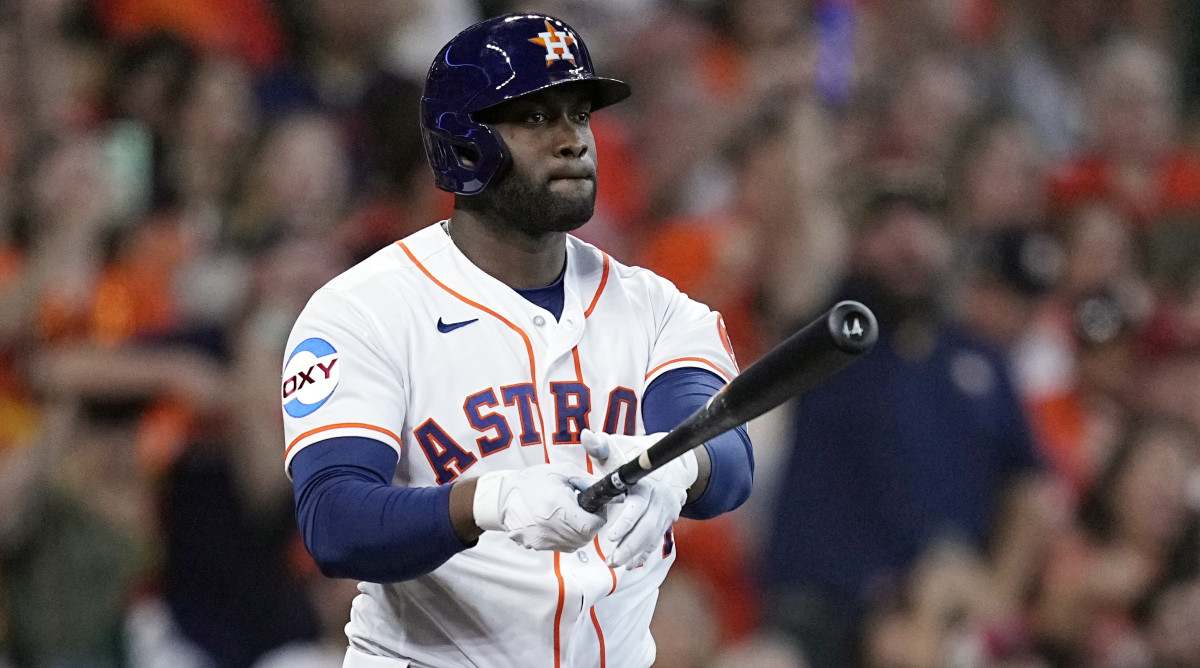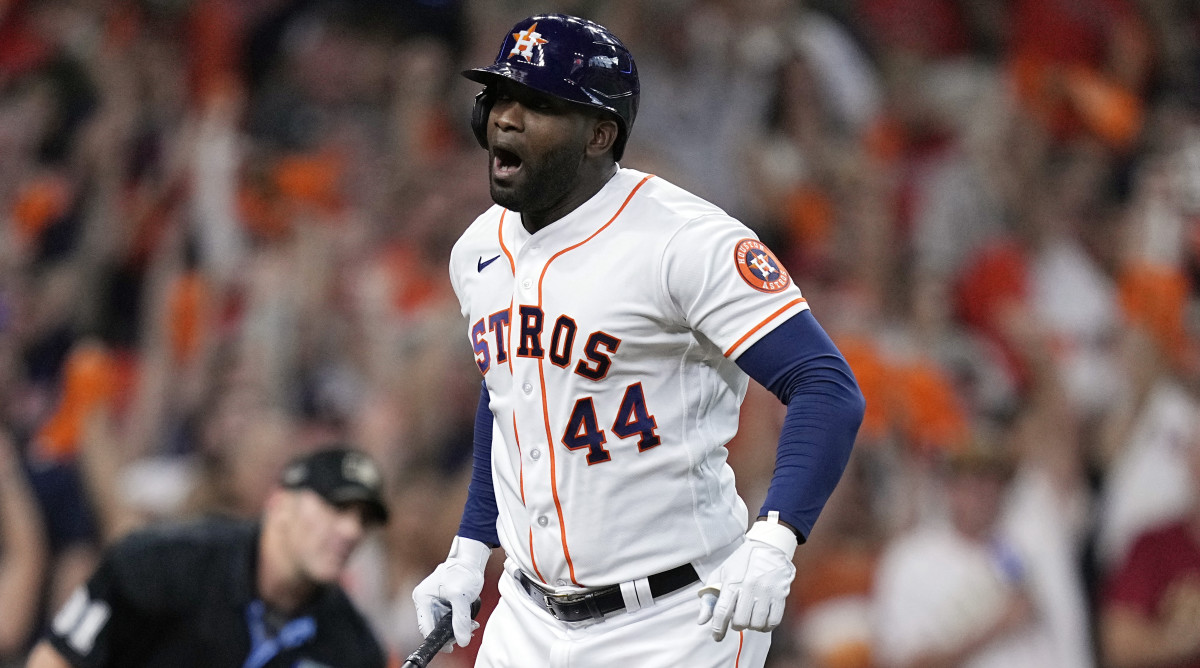Yordan Alvarez Wrecked the Twins’ Pitching Plan Against Him

Tigran Petrosian became a world chess champion in the 1960s by playing such a deeply defensive style that he flummoxed opponents into draws or, worse, decisive mistakes. He was the Greg Maddux of grandmasters.
“Chess,” he said, “is a game by its form, an art by its content and a science by the difficulty of gaining mastery in it.”
Petrosian had no idea with that observation he also nailed the maddening appeal of postseason baseball from the perspective of the dugout, or at least from the rest of us who follow along with them. A manager can dismiss the art of the game by relying only on its science, the way Toronto’s John Schneider carved a corner of postseason infamy for himself in the wild card round. Or he can strike the right balance and make the right moves, at least under the conventional rules of engagement, and still lose, the way Twins manager Rocco Baldelli did Saturday in ALDS Game 1 against the Astros.
Baldelli had one problem that overrode everything he did. That problem is named Yordan Alvarez. And it is not going away. The Houston slugger is the art of hitting raised to its highest form.
Alvarez is such a great hitter he defeats even smart strategies. In three straight at-bats with just four swings against three different pitchers, Alvarez homered, walked and homered, driving in three runs in what looked like a formulaic Astros postseason win, 6–4.

Stop me if you’ve heard this before. Jose Altuve smashed a first-pitch home run (by now, throwing him a first-pitch fastball in the zone is like touching a stove to see if it’s hot). Justin Verlander threw six shutout innings to run his Game 1 record with Houston to 6–0. And the Astros won at Minute Maid Park, where their .643 postseason winning percentage (36–20) is better than any team in any park except for the Cardinals at the previous Busch Stadium (35–18; minimum 40 games).
To the whole been-there-done-that vibe, you can add Alvarez blowing up conventional wisdom and lefthanded pitching .
“The guy is smart,” says Astros hitting coach Alex Cintrón. “He knows what he's looking for. He got a really good plan, pitch by pitch. And when you're an elite hitter, you do that. You look for pitch and make adjustments.
“You don't execute with him? He's going to make you pay.”
Alvarez is the most important piece on the chess board. Every manager that goes up against Houston must begin their series strategy with who they want to pitch against Alvarez in a big spot, if they want to pitch to him at all.
When I asked that question to Minnesota decision-makers on the eve of Game 1, they talked about pitching to Alvarez with a more east-west approach than north-south, which means moving the ball in and out rather than up and down. The Twins decided their best option to do that was righthander Kenta Maeda. Their next best option, the conventional one, was Caleb Thielbar, their only lefthander.
“One thing I know,” Cintrón said to me on Friday, “is that when you bring in a lefty to face Yordan, he almost always does damage. Look it up. When they bring a lefty in to face Yordan, he crushes them.”
The Phillies lost the World Series on that very strategy. Night after night, manager Rob Thomson chose lefty Jose Alvarado as his go-to guy against Alvarez. He lost that bet when Alvarez homered off Alvarado for the series-deciding hit in Game 6.
Houston manager Dusty Baker actually encouraged the Twins to take the same approach by batting Alvarez third with Kyle Tucker, another lefty, behind him. Most managers would split the lefthanded hitters with a righthanded bat between them. If it wasn’t exactly a trap for Baldelli to drop Thielbar into that “lane,” it was at least a statement by Baker that he has such high confidence in his two best hitters that he doesn’t have to go all Petrosian on his batting order by being so defensive.
Nor should Baker give any worry to lefties pitching to Alvarez and Tucker. Statistics on platoon splits are incomplete as you go back to the days of Ruth and Gehrig, but check out this one: the best left-vs.-left sluggers in the expansion era:
Highest SLG by Lefthanded Hitters vs. Lefthanded Pitchers, Since 1961
(Min. 700 PA)
1. Barry Bonds .569
2. Yordan Alvarez .565
3. Kyle Tucker .521
4. Larry Walker .518
“We have the three best lefties in the game,” Cintrón says. “Michael Brantley [also] is one of the best lefthanded hitters in this game. So, it doesn't matter if you go right or lefty. Those guys are really good.”
Baldelli and the Twins started Bailey Ober rather than Joe Ryan because they thought Ryan’s fastball would be more prone to pop fly home runs into the Crawford Boxes in left field. Good thinking, but Alvarez was the antidote.
Alvarez came up in the third inning after Ober hit Alex Bregman with a pitch. Baldelli had Maeda warming in the pen as his go-to option on the big lefty. Baldelli stuck with Ober. At 1-and-0, Ober floated a changeup into the zone. Alvarez crushed it for a two-run homer.
Yordan Alvarez's 7th career #postseason homer pads the @Astros lead. 💥 pic.twitter.com/T4cS1YtULo
— MLB (@MLB) October 7, 2023
So next time around, Baldelli tried Maeda. The Twins wanted him to pitch here in part because Maeda can be uncomfortable pitching in cold weather, which he has not done often. Temperatures for Game 3 in Minnesota are expected to drop into the low 40s.
As Maeda entered, Alvarez pulled Cintrón aside.
“What should I do against this guy?” he asked the hitting coach. “I don't know anything about him.”
“When he comes inside, it's a ball,” Cintrón told him. “When he [goes] out, it's a strike. Stay in the zone lower. “
“Why?”
“Because you can cover the split and the curveball. Just [set] your eyes down and that's it.”
Alvarez chased one splitter down, fouling it off, but took four pitches for a walk. He scored another run on a single by Chas McCormick.
Theilbar was next to take a crack at solving Alvarez. The Twins had just stunned reliever Hector Neris with two homers to make it a 5–4 game in the top of the seventh. Momentum was on their side.
You could not blame Baldelli for the move. Thielbar had not given up a home run to a lefthanded hitter since July 8, 2022 (Corey Seager). Lefties were hitting .195 against him over these past 15 homerless months.
Theilbar attacked with a first-pitch fastball. Alvarez swung through it. Thielbar came back with another fastball but missed away. That’s when Theilbar decided to throw his sweeper. Why not?
The reliever has thrown his sweeper for the past four years. He had thrown 483 of them to lefties in his career. He had allowed lefties only 12 hits and a .141 batting average on that pitch.
And never, ever a home run.
Until he threw one to Alvarez, the Great Antidote.
Alvarez smashed it off the netting attached to the rightfield foul pole. The ball, the momentum, the chance Minnesota had of winning ... all gone. Just like that.
Yordan rattles the foul pole for his second homer of the day! #Postseason pic.twitter.com/6aFrUhqsf4
— MLB (@MLB) October 7, 2023
“He says, ‘Okay, let me stay short and be aggressive,’” Cintrón says. “He was not looking for that pitch. He was early into the ground [with his front foot]. And he was able to hit the ball out of the ballpark.”
Baldelli knew this going in, but now he is firmly convinced he has an Alvarez problem. His two best options to neutralize Alvarez, Maeda and Thielbar, were taken off the chess board. Baldelli’s best option is not to pitch to Alvarez in any meaningful spot, the way Mariners manager Scott Servais suddenly discovered the intentional walk in his team’s series against Houston last week. Let Tucker and Jose Abreu try to beat you.
In his career, Alvarez has a higher batting average against lefties (.301) than against righties (.292). His OPS is only slightly lower (.947, .995). There is a mechanical reason why Alvarez defeats lefties so easily. He keeps his front side closed. His front foot lands slightly closer to the plate than his back foot. Most lefties, especially with the way lefthanded breaking balls start at them, have the exact opposite footwork—bailing away as the ball moves away.
“I said that he's so good whenever they bring a lefty out of the pen,” Cintrón says. “He's such a good hitter. He stays closed. When he lands, he stays [more] closed. He knows he's got to cover the slider, the curveball. So, his mentality ... It's more stay closed to the middle of the field.
“You can see what happened with Alvarado, too. Sinker in, homer center field. He stayed more closed to that. He doesn’t try to get too big. The guy is smart.”

Alvarez doesn’t want his head cluttered with a lot of data. He wants to know what a pitcher throws and maybe also how that pitcher has pitched to other lefthanded sluggers. That’s it.
“Basically, he trusts his approach,” Cintrón says. “The guy is smart. He knows what he's looking for. You know, he can be up there looking for a breaking ball and then change his mind and look for speed. The guy knows what he’s doing up there.
“He's a good hitter, but he's also smart. He’s got a really good plan at the plate, pitch by pitch. And, when you're an elite hitter, you do that.”
Alvarez’s home run off Thielbar was his fourth postseason homer off lefthanded pitchers since 2019. Only Corey Seager (five) has been responsible for more left-on-left damage in that time. Alvarez is slugging .549 against lefties in his postseason career.
The truth about Game 1 is that it was always going to be a difficult game for Minnesota to win, what with Ober making his first postseason start and Verlander his 35th, more than anyone in history but Andy Pettitte. The Twins must win Sunday with Pablo López on the mound, opposing Framber Valdez.
But the series was set in motion by those three consecutive Alvarez plate appearances. They will reverberate in Baldelli’s mind. It recalls what Iron Tigran once said when people suggested he open his conservative tactics and play a more interesting game.
“I could be more interesting,” he said, “and also lose.”
What next for Baldelli? With Alvarez, there is no easy answer.
